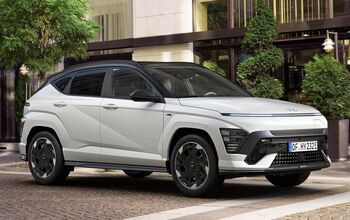Ford And Mazda: Still Happy Together
“We’re still dependent on each other,” Ford’s head of global product development Derrick Kuzak tells the Detroit News, dispelling rumors that Ford and Mazda are going their separate ways. “You cannot change that overnight.” According to Kuzak, many of Ford’s most important vehicles continue to be based off of Mazda platforms. Ford Chief Financial Officer Lewis Booth adds,
The strategic relationship continues. The business relationships continue. And they continue on the basis that they’ve always continued. Where it works to the benefit of both companies, we do things together, and where it doesn’t, we don’t.
Booth explains that, though in the past Ford was more dependent on Mazda, “now, it’s a little more two-way than it was. There’s more mutual sharing.” So why has Ford reduced its stake in Mazda over the last several years? Booth claims that the move was motivated more by Ford’s financial position than any dissatisfaction with the oldest alliance in the auto business. Mazda’s financial weakness now makes it more dependent on Ford than it had been, as analysts claim the Japanese firm is too small to be a true volume manufacturer but too large to be a niche brand. And besides engine and platform-sharing, the two firms operate joint ventures in China, Thailand, and South Africa.
And Chinese-market cooperation is being forced into the foreground of discussions between the two firms. The sale of the Volvo brand to Geely complicates the Changan Ford Mazda venture, as the 35 percent Ford, 15 percent Mazda and 50 percent Changan-owned venture currently builds Volvo-branded vehicles for the Chinese market. In addition to figuring out how to work that production out of Changan, Ford is seeking to improve the venture’s performance, as the Blue Oval’s Chinese efforts currently haul in a mere two percent of the crucial Chinese market. Work is under way on a plant expansion that would boost Changan Ford Mazda’s production to 600k units annually, nearly double what the number sold by the venture this year. As Ford and Mazda feel their way through their evolving relationship, Chinese market strategy should take on an increasingly important role.
More by Edward Niedermeyer
Latest Car Reviews
Read moreLatest Product Reviews
Read moreRecent Comments
- Add Lightness I don't waste a lot of time watching nothing much happening by watching the YouTube 6 minute highlights.
- MrIcky from my rental fleet experience, id rather drive one of these than a camry.
- Add Lightness Protectionist fear competition under the guise of paranoia.
- Kjhkjlhkjhkljh kljhjkhjklhkjh But facebook, instagram, twitter, your cell phone, your chevy/ford/dodge, your debit card, your credit card selling your data to the SAME OVERSEAS DATABROKERS is ok.Meanwhile parler, telegram literally run on russian hardware is also ''ok''
- Redapple2 Dear lord ! That face. HARD NO.


































Comments
Join the conversation
Many of us tried to explain that the alliance was still there, that the entanglement was deep. The real question is WHY did Ford sell the shares for so little? I believe, I do not know, that it was between Mazda and Ford. Sort of within family unspoken deal. This both knowing the real partnership was no cemented and the future still held a deep commitment between the two.
"...and it gets both Ford and Mazda some more news coverage that isn't all negative..."